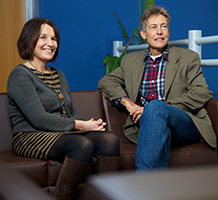
Professor Katrina Wyatt with Ben Bradshaw MP
From Backbench to Lab Bench at the University of Exeter
Ben Bradshaw MP got a fascinating insight into science in his constituency when he visited the University of Exeter Medical School, as part of a unique ‘pairing’ scheme run by the Royal Society – the UK national academy of science.
During his visit on Friday, Mr Bradshaw found out how Professor Katrina Wyatt works with local communities to devise programmes to support health and wellbeing.
He took part in drama workshops held in schools in a programme to support healthy lifestyles in children, and he found out how the Connecting Communities Programme (developed by researchers and practitioners at the Medical School) led to over 1000 young people taking part in dance workshops which has reduced crime levels in a Cornish town.
Mr Bradshaw MP said: “It was really enlightening to find out more about these innovative projects, which have working with communities right at their heart. Science is often seen as conducted in isolated laboratories, but this research involves people at every stage, to tailor a solution that could make a real difference to issues such as crime and obesity in the young. It’s a real asset for Exeter to have world-class research and medical education in the city, and it was fascinating to find out more about the Medical School’s work.”
Prof Wyatt has already spent a week in the Houses of Parliament as part of the pairing scheme’s ‘Week in Westminster’. This provided her with a ‘behind the scenes’ insight into how science policy is formed as well as an understanding of the working life of an MP.
Prof Wyatt said: “It’s great to further my partnership with Ben, after a fascinating week at Westminster. Often, there is a preconception that science involves men in white coats doing experiments in laboratories, but our work centres around working with community groups to identify the best way forward to help them improve their health around issues such as obesity.”
The Royal Society’s MP-Scientist pairing scheme aims to build bridges between parliamentarians and some of the best scientists in the UK. It is an opportunity for MPs to become better informed about science issues and for scientists to understand how they can influence science policy. Over 200 pairs of scientists and MPs have taken part in the scheme since it was launched in 2001.
Sir Paul Nurse, President of the Royal Society said: “We live in a world facing increasing challenges that can only be addressed with a clear understanding of science. From climate change to influenza outbreaks, GM food to nuclear power, our MPs have to make decisions about complex issues that will affect the lives of all those in the UK and, in many cases, more widely throughout the world. This means that MPs and scientists have a responsibility to engage with each other to get the best possible scientific advice into public policy making.
We set up the Royal Society’s MP Scientist pairing scheme in 2001 to provide the opportunity for MPs and scientists to build long-term relationships with each other and have now organised over two hundred pairings.
I know many parliamentarians and scientists who have gained from the scheme, and the shaping of public policy can only improve over time as these relationships continue to grow.”
Date: 27 January 2014
